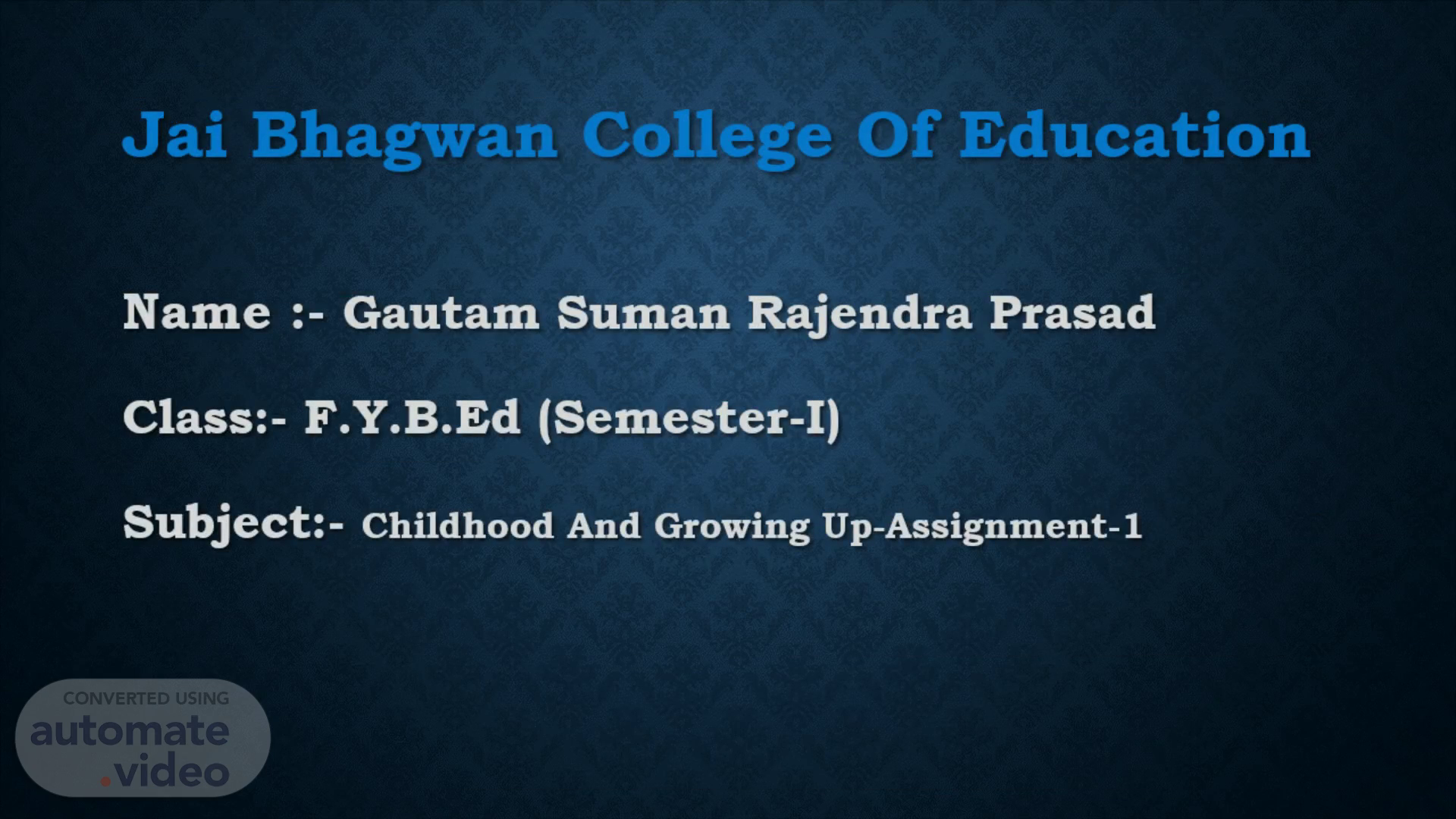
Jai Bhagwan College Of Education Name :- Gautam Suman Rajendra Prasad Class:- F.Y.B.Ed (Semester-I) Subject:- Childhood And Growing Up-Assignment-1
Scene 1 (0s)
Jai Bhagwan College Of Education Name :- Gautam Suman Rajendra Prasad Class:- F.Y.B.Ed (Semester-I) Subject:- Childhood And Growing Up-Assignment-1.
Scene 2 (12s)
Biography Of Albert Bandura Psychologist (1925-2021).
Scene 3 (20s)
Introduction. Albert Bandura, (born December 4, 1925, Mundare, Alberta , Canada-died July 26, 2021, Stanford, California, U.S.), Canadian-born American psychologist and originator of social cognitive theory who is probably best known for his modeling study on aggression, referred to as the “Bobo doll” experiment, which demonstrated that children can learn behaviours through the observation of adults..
Scene 4 (41s)
Albert Bandura's Early Life. Bandura Was The Youngest Of Six Children Born To Parents Of Eastern European Descent. His Father Was From Kraków, Poland, And His Mother From Ukraine; Both Immigrated To Canada As Adolescents. After Marrying, They Settled In Mundare, Alberta, Where Bandura’s Father Worked Laying Track For The Trans- canada Railroad..
Scene 5 (59s)
Education of Albert Bandura. Graduating From High School In 1946, Bandura Pursued A Bachelor’s Degree At The University Of British Columbia And In 1949 Graduated With The Bolocan Award In Psychology, Annually Awarded To The Outstanding Student In Psychology. He Then Did Graduate Work At The University Of Iowa, Where He Received A Master’s Degree In Psychology (1951) And A Doctorate In Clinical Psychology (1952)..
Scene 6 (1m 18s)
Albert Bandura theory. Social learning theory, proposed by Albert Bandura, emphasizes the importance of observing, modelling, and imitating the behaviours, attitudes, and emotional reactions of others . Social learning theory considers how both environmental and cognitive factors interact to influence human learning and behaviour..
Scene 7 (1m 35s)
Bandura's 4 principles of social learning. The Four Steps In The Social Learning Theory Of Bandura Attention - The Behaviours Of The Model Must Grab The Learner’s Attention For Them To Notice The Behaviour And To Implement Observational Learning. Retention- Retention Is An Internal Memory Event That Is Essential For Learning A New Behaviour. Reproduction- Reproduction Is The Ability To Execute The Model’s Behaviour. You May Want To Reproduce The Behaviours Of A Person You Admire.
Scene 8 (1m 56s)
Motivation- Even Though A Person May Have The Ability To Reproduce The Behaviour, They Must Have The Desire Or Will To Do It. People Are More Motivated To Mimic The Behaviour If The Behaviour Is Rewarded With Something That Has More Value Than The Effort To Reproduce The Behaviour. If The Behaviour Is Followed By Punishment, People Are Less Likely To Imitate The Behaviour..
Scene 9 (2m 16s)
Albert Bandura do for psychology. Albert Bandura is an influential social cognitive psychologist who is perhaps best known for his social learning theory, the concept of self-efficacy, and his famous Bobo doll experiments. He is a Professor Emeritus at Stanford University and is widely regarded as one of the greatest living psychologists..
Scene 10 (2m 40s)
Albert Bandura contribution to psychology. Bandura developed social learning theory and the concept of self-efficacy, which have had enormous influence across social, cognitive, developmental, educational and clinical psychology. Bandura’s work is considered part of the cognitive revolution in psychology that began in the late 1960s. His theories have had a tremendous impact on personalit-ypsychology, cognitive psychology, and psychotherapy..
Scene 11 (2m 59s)
Albert Bandura to receive National Medal of Science.
Scene 12 (3m 16s)
Thank YOU!!.